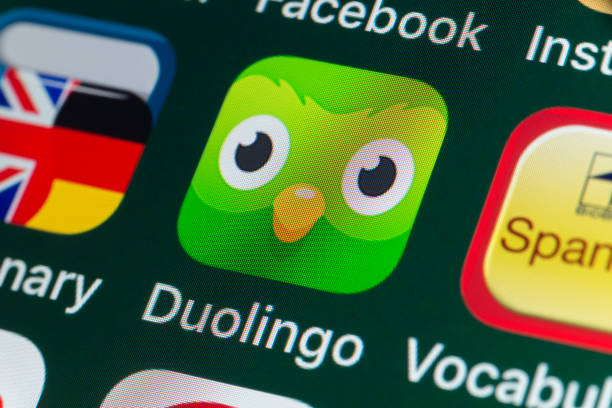If you’re learning a new language, you’ve probably explored the Duolingo app. Seeing as it’s one of the biggest language learning apps, it has over 95 languages with more than 500 million users. And although it takes a gamified approach with daily reminders, Duolingo lessons are known to get repetitive. Asides from it getting boring over time, you learn phrases and words that aren’t exactly relevant in your day-to-day.
So if you’ve been looking for a Duolingo alternative that focuses on learning actual phrases, you’re in luck. This article will share seven free Duolingo alternatives along with some of their key features. Keep reading to find out more.
1. Memrise
If you love the gamified lessons on Duolingo, then this free app is a great alternative to start with. Memrise uses flashcards and immersive content to teach language vocabulary lessons. One unique feature is that these courses have audio and video clips of locals so you can learn how to speak like a native. This might be because you’d have to train as an undercover agent learning a language.
This dramatic concept helps you pick on mannerisms and nuances in the language. So because you’d practice a lot of listening and speaking, you’d also get to build your language comprehension skills. Memrise has over 100 languages available to choose from. It’s available for free with limited features.
Key features:
- Real-life audio and video from native speakers
- Flashcard-based and gamified lessons
- Over 100 languages supported
2. Mondly
Want to be an all-rounder in speaking, writing, listening, and reading? Then Mondly is your go-to alternative. It is an advanced learning app that uses voice recognition to ensure that you get words right. The unique feature of this language learning app is that you have small bite-sized lessons for as short as 10 minutes every day. Since most of the lessons are interactive and conversational, you can immediately pick up speaking in a foreign language.
Unlike Duolingo, there’s a keen focus on ensuring that you get pronunciations right. That’s why on Mondly, you have access to recordings of native speakers so you know how each word is pronounced. This app currently supports about 33 languages and although it has a free version, the premium plan is cheaper than Duolingo.
Why Mondly stands out:
- Voice recognition for pronunciation feedback
- Short, daily interactive lessons
- Native speaker audio for every language
3. Ling
Another Duolingo alternative that uses a gaming approach for teaching is Ling. Ling provides highly interactive games like quizzes, puzzles, sentence composition, and even a smart bot you can chat with. While this app mostly targets beginners and intermediate learners, it still has a pretty extensive curriculum.
There’s plenty of conversational practice and you’d use a ton of grammar tips to ensure that you can apply your knowledge in the real world. Although Ling has only about 50 languages, there’s an option for real-life lessons with tutors. However, this is only available on the paid plan. You can get one free lesson on the free trial plan though.
What you get:
- Interactive games and chatbot conversations
- Practical grammar tips and real-world vocabulary
- Live tutor option (paid)
4. Lingvist
The creators of Lingvist took a different approach unlike the other apps listed in this article. Instead of using a gamified approach, this learning app uses a scientific approach so you can learn languages faster. For starters, you only learn a vocabulary you’d learn in actual conversations of your preferred language. So instead of learning random impractical phrases on Duolingo, you can use this alternative to learn practical grammar.
Since it’s a scientific method of learning, it analyzes your weak points and reorders your curriculum to overcome your learning curve. On the app, you learn via flashcards that pop on your screen. The only downside is that this app has only 9 languages available.
Highlights:
- Adaptive learning based on your progress
- Focus on practical, conversational vocabulary
- Flashcard-based lessons with analytics
5. Language Drops
Language drops also has a gamified and interactive approach, however, it only allows you to take five minutes lessons on the free plan. This app is designed for very busy individuals who’d like to squeeze in lessons during the day. Once you’re logged in, you have flashcards with appealing illustrations for you to match with words. The smooth interface lets you practice memory association exercises for easy recall.
You can play games on this app, listen to audio lessons, and so much more. You have access to about 45+ languages. Unfortunately, due to the limitations of the free plan, you cannot become a fluent or native speaker with this app. However, it’s a great option for learning the basics.
Quick facts:
- Five-minute lessons for daily practice
- Visual flashcards and memory games
- 45+ languages supported
6. Busuu
If you’re very keen on transitioning from the basics to an advanced level in a language, the Busuu might just be the best option for you. This Duolingo alternative not only offers a very detailed and well-structured curriculum, but your lessons are also in bite sizes. As you progress, you’d only see lessons and exercises that are ideal for your level. There’s also gratification in the certificates you’ll get when you pass every level.
Unfortunately, the free version is very limited and so grammar lessons, study plans and access to native speakers are on the premium plan. If you do, however, choose to subscribe, you can practice with professional tutors in individual or group classes. On this learning app there are only 13 available languages so although there are not too many options, the ones available are very structured.
Why try Busuu:
- Practice with native speakers
- Personalized study plans and grammar review
- Community-driven learning experience
7. Hello Talk Languages Free
If you’d really prefer to do things your own way by talking to people who speak a language you’d want to hear, then Hello Talk is the perfect option for you. Here, you don’t get study materials or other courses to learn. Rather it acts as a social app where you can have conversations with multi-lingual people around the world. Sort of like a virtual pen pal.
While it’s mostly known for its chat feature, there’s a video call feature as well. Here, you can discuss pronunciation, idioms, and other things that are difficult to explain over chat. This helps ensure that you cover speaking, reading, writing, and listening. To get started, you simply have to go through profiles and find mutual interests before asking to connect.
Best features:
- Direct chat with native speakers
- Built-in correction and translation tools
- Voice and video messaging
8. Speak (AI-Powered, New for 2025)
Speak is one of the latest AI-powered language apps making waves in 2025. Using advanced conversational AI, Speak lets you practice real-life dialogues and receive instant, personalized feedback on your pronunciation and grammar. The app adapts to your learning style, simulating real conversations and even role-playing different scenarios.
I’ve found Speak especially useful for building confidence before traveling or attending business meetings in another language. The AI is impressively natural, and the app supports a growing list of languages.
AI advantages:
- Real-time feedback from conversational AI
- Adaptive learning paths and scenario-based practice
- Expanding language support
9. ChatGPT Language Tutor (AI, New for 2025)
OpenAI’s ChatGPT has evolved into a powerful language learning assistant. You can now have full conversations, grammar drills, and vocabulary quizzes with ChatGPT in dozens of languages. It can role-play as a language partner, correct your mistakes, and even explain cultural nuances.
The best part? You can tailor your sessions to your goals—whether you want to practice business French, casual Spanish, or prep for a trip. Many learners now use ChatGPT as a supplement or even a replacement for traditional language apps.
Why use ChatGPT:
- Unlimited conversation and instant correction
- Customizable lessons and role-play scenarios
- Supports dozens of languages
Conclusion
Learning a language is entirely dependent on how fast you pick up new words and nuances. While some may prefer to study through courses, others might just prefer to talk to native speakers. Irrespective of your preferred route, we’ve covered the Duolingo alternatives that provide speaking, listening, writing, and reading exercises for people learning new languages.
Let us know which of these options you’d be trying out soon and don’t forget to share this post with a friend too.
Discover more from Dignited
Subscribe to get the latest posts sent to your email.












